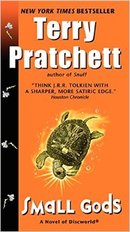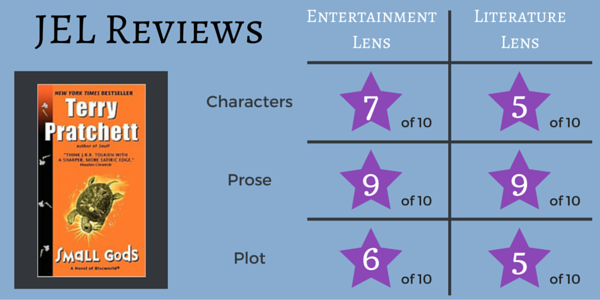Paul and I joined Tubby & Coo’s Fantasy Book Club, forcing me to be a better human and read at least one fantasy book a month. To capitalize on that opportunity, I’ll be writing reviews of each book as we go!
Be warned: I’m a forgiving reviewer. When you come here, you will not find me eviscerating novels. I’ll point out what I liked and what I didn’t like, and I’ll root everything in what it is—my opinion—rather than some self-ordained conception of what is “good” and “bad.”
I also plan to break each review into two sections: one for those who haven’t read the book, and one for those who have read the book. And I’ll rate (1) characters, (2) prose, and (3) plot through two lenses—entertainment and literature. (Basically, how I felt about it while I was reading, and how I felt about it when I thought about what I was reading.)
That being said, on to #JELReviews!
Be warned: I’m a forgiving reviewer. When you come here, you will not find me eviscerating novels. I’ll point out what I liked and what I didn’t like, and I’ll root everything in what it is—my opinion—rather than some self-ordained conception of what is “good” and “bad.”
I also plan to break each review into two sections: one for those who haven’t read the book, and one for those who have read the book. And I’ll rate (1) characters, (2) prose, and (3) plot through two lenses—entertainment and literature. (Basically, how I felt about it while I was reading, and how I felt about it when I thought about what I was reading.)
That being said, on to #JELReviews!
For those who haven't read the book:
| I hate how long it took me to pick up a Terry Pratchett novel. From what I’ve been told, Small Gods is one of the better standalone entry points into the Discworld universe, and I’d agree. Jumping in without context served me well. Small Gods is good. In preparing to write this, I scrolled through many Goodreads reviews and found them written in a dozen different languages, with 98% of reviewers supplying 3-star ratings and higher. Only 2% of reviewers gave the book 2 stars. |
0% gave it 1 star—and I’m not surprised.
You’ll know whether you’ll enjoy Small Gods quickly. The book descriptions vary between editions, but I’d advise eschewing the book descriptions altogether.
Read the first two pages.
If you aren’t delighted by the first two pages, then you’re likely among that 0% of humanity who’d dislike the whole book. (And, honestly, I can’t imagine I’ll impress you either! How did you get here?)
Told from an omniscient and hilarious point-of-view, Small Gods’s greatest strength is in its prose—the sentences offered to the reader. Hilarious, witty, insightful, and entirely “quotable.”
I’d have read the whole book aloud just to taste it, if I’d had the stamina.
You’ll know whether you’ll enjoy Small Gods quickly. The book descriptions vary between editions, but I’d advise eschewing the book descriptions altogether.
Read the first two pages.
If you aren’t delighted by the first two pages, then you’re likely among that 0% of humanity who’d dislike the whole book. (And, honestly, I can’t imagine I’ll impress you either! How did you get here?)
Told from an omniscient and hilarious point-of-view, Small Gods’s greatest strength is in its prose—the sentences offered to the reader. Hilarious, witty, insightful, and entirely “quotable.”
I’d have read the whole book aloud just to taste it, if I’d had the stamina.
[A tortoise] has about as good a turn of speed as you need to hunt down a lettuce.
The plot and its players impressed me less than the prose, but the book does not rely on its story. Things happened, and I kept reading, but I never kept reading to learn what would happen next. I never worried much about anyone (until the end) or suffered from burning questions about the narrative.
I read more, because I wanted to read more. I wanted to experience more of Pratchett’s writing, wanted to enjoy whatever devastatingly true thing he’d say next.
It was great.
After we left the book club meeting, Paul laughed and said, “The problem with Small Gods is that you can’t talk about it. After you say, ‘It was amazing!’ there’s nothing else to say besides just pointing out all the parts that were amazing.”
Paul’s right. And I don’t want to spoil anything by pointing to any specific parts.
Suffice to say, I enjoyed Small Gods. It was a much-appreciated introduction to the Discworld books and one that wholly satisfied me.
I'd definitely recommend!
I read more, because I wanted to read more. I wanted to experience more of Pratchett’s writing, wanted to enjoy whatever devastatingly true thing he’d say next.
It was great.
After we left the book club meeting, Paul laughed and said, “The problem with Small Gods is that you can’t talk about it. After you say, ‘It was amazing!’ there’s nothing else to say besides just pointing out all the parts that were amazing.”
Paul’s right. And I don’t want to spoil anything by pointing to any specific parts.
Suffice to say, I enjoyed Small Gods. It was a much-appreciated introduction to the Discworld books and one that wholly satisfied me.
I'd definitely recommend!
For those who have read the book:
Spoilers ahead!
Time for my one obligatory complaint: I wish it had been divided into chapters. I have trouble knowing when to stop for breath without chapters.
Otherwise… I can’t envision any way to improve this book without changing its essence, and I’d never suggest changing the essence of something so solid, so pleasing.
Small Gods kept me laughing, made me hate the referenced systems of my own world, and taught me a great number of new curses.
Time for my one obligatory complaint: I wish it had been divided into chapters. I have trouble knowing when to stop for breath without chapters.
Otherwise… I can’t envision any way to improve this book without changing its essence, and I’d never suggest changing the essence of something so solid, so pleasing.
Small Gods kept me laughing, made me hate the referenced systems of my own world, and taught me a great number of new curses.
“Your sexual organs to sprout wings and fly away! […] Your ankles to be crushed in the jaws of giants! […] Your intestines to be wound around a tree until you are sorry!”
Small Gods also made me think, about too many things to detail in a blog post, but I’ll reference at least one.
Toward the end, when Simony, Didactylos, and Urn have infiltrated Omnia, Simony puts Didactylos in front of a crowd to discuss the falsehood of the Church of the Great God Om and the truthiness of the Discworld.
Didactylos doesn’t want to be a prophet. He sees no purpose in “believing” in things that exist. He insists he only recorded a fact that he felt people should know. So, when he gets in front of the crowd, he speaks to them like a historian might give a lecture.
This irks Simony. While talking to Urn, he complains about Vorbis and the Church leading people to death over lies, then immediately condemns Didactylos for telling the unpolished truth.
Toward the end, when Simony, Didactylos, and Urn have infiltrated Omnia, Simony puts Didactylos in front of a crowd to discuss the falsehood of the Church of the Great God Om and the truthiness of the Discworld.
Didactylos doesn’t want to be a prophet. He sees no purpose in “believing” in things that exist. He insists he only recorded a fact that he felt people should know. So, when he gets in front of the crowd, he speaks to them like a historian might give a lecture.
This irks Simony. While talking to Urn, he complains about Vorbis and the Church leading people to death over lies, then immediately condemns Didactylos for telling the unpolished truth.
“Millions of people have died for—for nothing but lies. We can stop all that--
[…]
You can’t inspire people with facts. They need a cause. They need a symbol.”
Our world rotates around marketing, around messaging, rather than truth. Observe any election across the world for an example. Observe any business model.
And worst, Simony’s right—people do need that cause, that symbol, for motivation. And those symbols are always distortions or flawed representations of truth, rather than truth itself. I recently attended a leadership conference with a troubling thesis: we value integrity, but we follow clarity.
We see the importance of complex truth, but we live our lives in service of easily understood and quickly expressed symbols.
Ouch.
This is what Small Gods does. In a few lines—in every few lines—Pratchett offers a revelation, a question, a probe into the contradictions of humanity.
And worst, Simony’s right—people do need that cause, that symbol, for motivation. And those symbols are always distortions or flawed representations of truth, rather than truth itself. I recently attended a leadership conference with a troubling thesis: we value integrity, but we follow clarity.
We see the importance of complex truth, but we live our lives in service of easily understood and quickly expressed symbols.
Ouch.
This is what Small Gods does. In a few lines—in every few lines—Pratchett offers a revelation, a question, a probe into the contradictions of humanity.
Overall, Small Gods leaves little room for review or commentary—it comments on itself and our world, both of which are too big for me to tackle. And I’d worry that by attempting to encapsulate it in any 1,000-word review, I’d dilute everything impressive and true into one of Simony’s symbols.



 RSS Feed
RSS Feed


